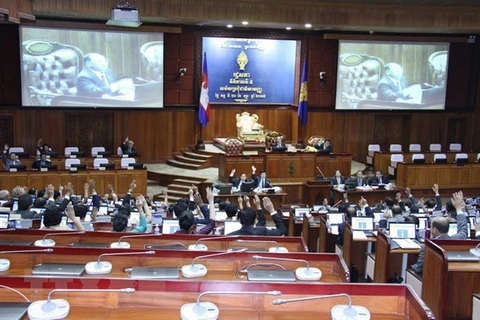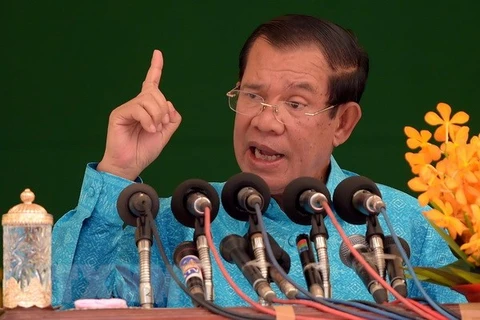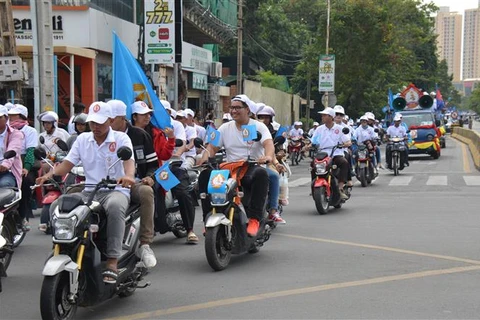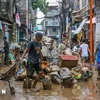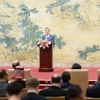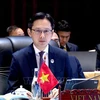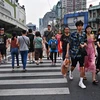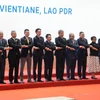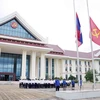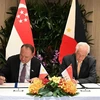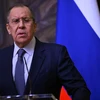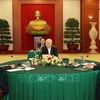Hanoi (VNA) - Over the past five-tear term of the National Assembly, the Cambodian People’s Party (CPP) has done a lot for the Cambodian people, helping raise public confidence in the upcoming general election.
The maintenance of peace, political stability and security has created favourable conditions for Cambodia to continue recording new and greater achievements in socio-economic development and in the improvement of the people’s living standards.
Cambodia has emerged from a low-income country into a low-middle income nation, and is on the path towards the high-middle income status by 2030.
Such achievements have demonstrated the success in the implementation of the Political Platform and the Rectangular Strategy - Phase 3 during the five-year term of the Government led by Prime Minister Samdech Techo Hun Sen, and proved that they have received public support and trust.
This was primarily attributable to the CPP led by PM Hun Sen that has worked to strengthen national unity, step up Constitution enforcement and protect the monarchy.
The Party has also promoted democracy and multi-party freedom, and ensured respect for human rights, law observance and social equality.
These mottos continue to be included in the CPP’s election platform for the 2018-2023 period.
Cambodia’s economy has developed rapidly and sustainably with an average annual growth rate of 7.7 percent over the past two decades and resilience to the financial crisis in 2008. With the performance, Cambodia has been ranked by the World Bank among countries with record high growth rates and considered a new tiger economy in Asia.
The country’s firm growth has been reflected through outcomes of such sectors as industry, garment-textile, construction, agriculture, tourism and real estate.
It is noteworthy that Cambodia has transformed from an agriculture-based country into a nation driven by industry and services.
Every effort for sustainable development aims to serve the people. Statistics reveal that Cambodian people’s living standards have been improved significantly, with per capita income increasing from 1,042 USD in 2013 to 1,563 USD in 2018.
The poverty rate has also been reduced from 53.5 percent in 2004 to 13 percent in 2016, and is expected to be brought down further in the time ahead. Besides, the income gap has been narrowed down gradually.
Thanks to the cautious implementation of macro-economic policies to keep the economy stable and to promote the economic diversification, the competiveness, production and consumption inside the country, Cambodia has reaped encouraging fruits in other aspects.
The country’s foreign reserves expanded from more than 3.64 billion USD in 2013 to 9.05 billion USD in 2017 thanks to increasing foreign direct investment (FDI) inflows.
Apart from better payment balance, Cambodia has the lowest public debt in the region.
The World Bank has forecast that Cambodia’s economy would grow 7 percent each year during 2018-2019. In the first four months of this year, the country attracted 634 million USD in FDI with 47 new projects, while its export turnover reached 8.3 billion USD.
In the first quarter of 2018, Cambodia welcomed 1.7 million international tourists, up 1.9 percent against the same period last year.
PM Hun Sen has pointed out that the Royal Government has continuously worked out urgent measures to deal with all difficulties, worries and aspirations of people, and paid due attention to improving the quality and efficiency of and to expanding public services.
Democracy, rights to freedom of citizens, and law enforcement have also been intensified, he said.
In the election platform, the CPP commits many policies beneficial to people such as no tax on farmer households’ agriculture land, higher monthly salaries for workers, labourers, civil servants and armed forces, and higher pensions and other allowances.
Besides, youths from all walks of life will have opportunities to receive vocational training, get jobs and participate in the decision-making process at both central and grassroots levels. Each district will have a high school, each commune a secondary school and each village a primary school.
Residents will have access to better health care at State medical centres and hospitals. The poor and those who are unable to work will get free health check-ups and treatment at State medical centres and hospitals.-VNA
VNA

